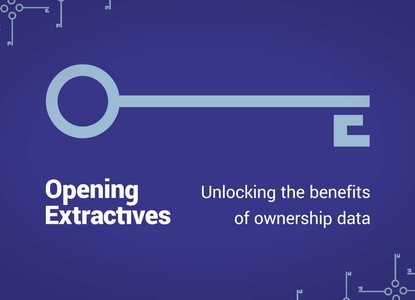Lessons for an accountable transition: Leveraging beneficial ownership information for natural resource governance
Help us understand how you are making use of resources from the Open Ownership website by filling out this short survey
Publication type
Briefing
Publication
Topics
Extractives,
Opening Extractives
Sections
Implementation
Summary
This brief uses cases in countries from Armenia to Zambia to show how information on beneficial owners – the people who ultimately own, control, and benefit from companies and other corporate vehicles – supports integrity and accountability throughout the extractives value chain. Experience in the sector has shown that a lack of solid accountability mechanisms has facilitated countless cases of corruption and fraud. Significant progress is still needed to ensure beneficial ownership information is effectively collected, published, and used to the fullest extent to strengthen safeguards in the governance of natural resources.
Nevertheless, advances in transparency norms and in their application for extractives have generated valuable learnings. The brief offers a set of actionable lessons to improve the availability of data on beneficial owners and its use to take action for accountable natural resource extraction as the energy transition progresses. It draws on experiences gained through the Opening Extractives programme, which has been accelerating the availability and use of beneficial ownership data in resource rich countries since 2021.
Key Lessons/Messages
- Government actors need a policy aim for implementing beneficial ownership disclosure, and do so through comprehensive legislative frameworks. Effective implementation includes making data interoperable, consulting data users, and understanding the questions that they might be asking using beneficial ownership information.
- There are many government actors who can use beneficial ownership information for accountability, such as mining licensing agencies, procurement authorities, tax agencies, and law enforcement. Together they ensure that the data is reliably collected and well used across the value chain. Licensing and contracting is a key point of intervention.
- Private companies and state-owned enterprises can use beneficial ownership information to reduce risks when subcontracting services, in commodity trading, and when performing due diligence. Legislation should ensure the widest range of corporate vehicles are covered by disclosure requirements, including state-owned enterprises.
- International organisations have a role to play in pushing for the standardisation of beneficial ownership information to support its use, as combining data from different jurisdictions is often essential to gaining full visibility of ownership structures. They can also advocate transparency in standards for responsible business practices.
- Media and civil society organisations have exposed the misuse of anonymous corporate vehicles and held companies and governments to account. Assuring their access to beneficial ownership data is critical and done most efficiently through its publication. They can also support one another to use the information and share lessons learned.

